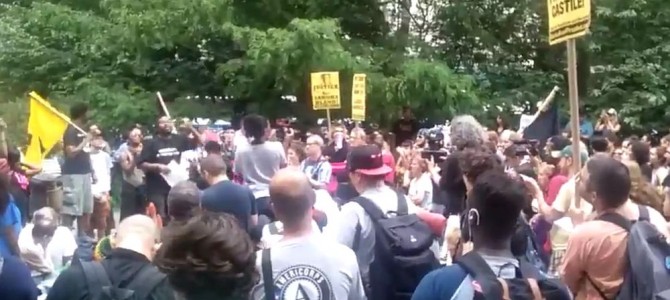
One day after Black Lives Matter protesters attempted to occupy New York’s City Hall Park, one of their central demands was met. With the resignation of Police Commissioner Bill Bratton Tuesday, the group can claim a victory in its effort to transform policing in America’s largest city.
A toast to Bratton’s resignation at #ShutDownCityHallNYC. pic.twitter.com/m01Jo2NXBg
— Keegan Stephan (@KeeganNYC) August 2, 2016
Although Bratton’s resignation had been rumored for some time and he and the mayor deny protests influenced the move, BLM activists toasted the decision today. Republican Staten Island city councilman Joe Borelli says: “Essentially, they got what they wanted. Causation is not relevant, perception is.” The unmistakable perception is that the move, long in the planning or not, is a concession to protesters.
Along with Bratton’s removal, the protesters demanded that the New York City Police Department (NYPD) be disbanded, with its budget redirected to community activism. If, for some reason, the city government refuses to disband the police, protesters demand that “broken windows” policing, first championed by Bratton in the 1990s, be abolished.
Broken windows is a police practice of focusing on small, quality-of-life crimes to stem larger, more violent crimes. Its implementation is widely credited with New York City’s steep drop in crime under former mayors Rudy Giuliani and Michael Bloomberg.
Black Lives Matter Protests
Late into Monday night, protesters in City Hall Park gathered and chanted “How do you spell racist? N-Y-P-D,” as NYPD officers looked on. According to some protesters I spoke with, the plan was to stay in the park indefinitely, in the style of Occupy Wall Street. While that did not happen, a large gathering of hundreds did essentially take over the park, which was cordoned off by police and fencing.
The atmosphere swung from jubilant to angry as activists poured out their frustrations over what they view as a racist and corrupt police force. One protester told me “this movement is trying to bring to light stories from people who have no other access to [presenting] information.” But other protesters took a harder line, insisting New York City’s police force was beyond redemption and must be done away with.

By midnight, the protest had mostly dissipated, and a relative calm was restored to the downtown Manhattan neighborhood. According to Gothamist, the protesters left to go to 8 Spruce Street, a privately owned park where approximately 100 stayed the night. There were no arrests.
Mayor Bill de Blasio, a progressive Democrat, was a champion of Occupy Wall Street. While running for mayor in 2013 he said, “Occupy Wall Street pulled the growing crisis of income inequality out into the light of day.” He was also at speaker at the occupation of Zuccotti Park 2011. This makes for an awkward situation, as his city government is now being occupied. Although unlikely to fall to a Republican in next year’s general election, there have been murmurs, specifically from black city leaders, of a primary challenge.

With pressure already building from the black community, Monday’s protests turned the screws a little tighter. Bratton’s resignation Tuesday may well provide an exhaust valve for Black Lives Matter’s anger at the NYPD and mayor. While it is possible Bratton’s decision to step down was already scheduled for Tuesday, its announcement provides a clear victory for those who took to New York’s streets Monday night.
Nobody Elected Black Lives Matter
If the mayor and police commissioner’s decision, or even the timing of the announcement, was influenced by Monday’s protests, it represents a dangerous surrender. Mayor de Blasio was elected to serve New York City, not Black Lives Matter. And nobody elected the latter. Even to allow the appearance that protesters are influencing police policy sends a dangerous message. Handing a big win to people who sing songs about how racist the police are legitimizes that contention.
While many people of all political stripes acknowledge and address growing concerns about police violence towards minorities, succumbing to demands is not a sound policy. That’s especially so when the city has already reduced penalties for many of the quality-of-life or “broken windows” crimes BLM is protesting. How far will de Blasio go to foster the perception that progressive protesters can persuade him?
Giuliani and Bloomberg left de Blasio with a city that, unlike many others such as Chicago, is not suffering from a crisis of violent crime. This didn’t happen by accident. It is the direct result of policing policies that have influenced departments all over the country. It is a result of practices that work. For the city to now begin rejecting police policies that have kept millions safe is a terrible idea that should give Gotham’s voters pause next year.
Police violence is a serious and complicated issue. It deserves full attention, perhaps even protest. But decisions about how to fight crime must never result from or appear to result from frustration and anger. The mayor, who has a history of angering his police force to the point where they have asked him not to attend police funerals, should know better. The timing of this announcement is a smack in the face of the NYPD and a wink and a nod at their fiercest detractors.
Bratton is moving on to a lucrative new job. De Blasio may have calmed some of his critics in the black community. But tens of thousands of New York police officers must watch as those who call them racist and corrupt celebrate the fulfillment of one of their central demands. Out of simple courtesy to those officers and the millions they risk their lives to protect, de Blasio should have waited to have Bratton’s resignation announced. But he didn’t. Surely, today anti-police activists in New York City are wondering: what demand can we have met next?









